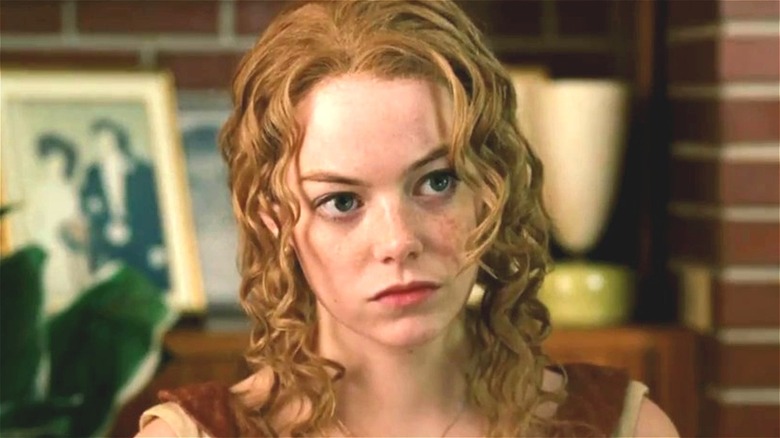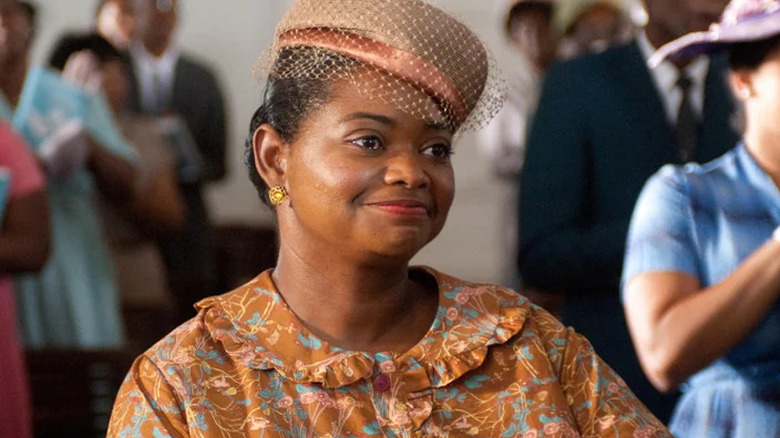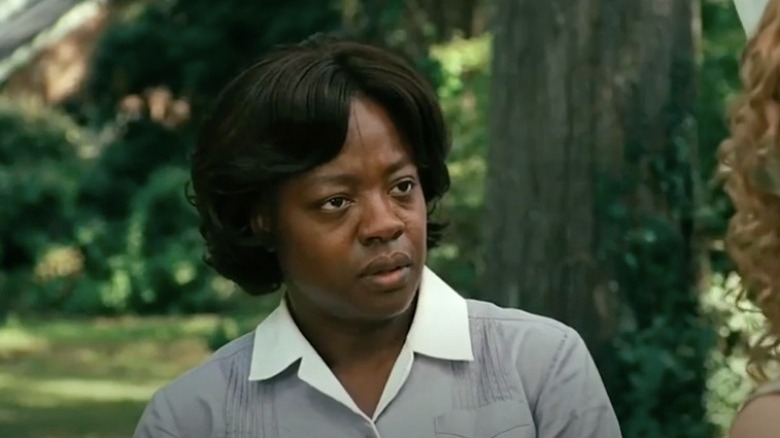Is The Help Adapted From A True Story?
Watching "The Help," it's easy to believe in the characters, plot, and themes throughout the 2011 film. A progressive white woman, Skeeter Phelan (Emma Stone), decides to tell the truth about the experiences of Black maids working in her community? Well, we certainly want to imagine such a scenario is real. One Black maid, Minny Jackson (Octavia Spencer), gets revenge on her boss in a particularly perfect — not to mention truly disgusting — way? We definitely hope that one happened. Systemic racism portrayed as pervasive in the 1960s South? Yes, sadly, that rings true.
Movies are meant to bring us into a fictional world we can believe in, but that doesn't mean the events of the story always took place in real life. Except "The Help" is the kind of film that makes you wonder. It does seem awfully specific, as it brings us into an invisible culture and gives a voice to people who've been silenced for centuries. Is "The Help" based on a true story? The possibility is too tantalizing to ignore.
The Help is based on a book
One thing we know for sure: The movie "The Help" is based on a 2009 novel (of the same name) which, by definition, is a work of fiction. So that would seem to answer the question of whether the story is true or not in the negative. Then again, the author of the book, Kathryn Stockett, is a white woman. Is she the real Skeeter Phelan?
A few similarities do exist between the story Stockett wrote and the life she's lived. Stockett grew up in Mississippi in a community where white women often employed generations of Black maids who came from the same families. When she was writing the book, Stockett interviewed Black maids as well as their white employers. Her experience was not unlike that of her protagonist. "It is hard to approach someone and say, 'Excuse me, but what was it like to work for a white family in the South during the 1960s?' I guess I felt a lot like Skeeter did in 'The Help,'" Stockett told BookBrowse. "But I did hear plenty of interesting stories."
The question is: Did those real stories wind up in the book? Or did Stockett use them as jumping off points for an entirely fictional tale she created?
The Help hit some bumps
After the movie came out, a Black woman actually sued Stockett over the question of how true the book really was. Ablene Cooper, who worked for the author's brother for many years, claimed her likeness and story had been stolen. She said she was the real person behind the character Aibileen Clark (Viola Davis). There were some undeniable similarities between the two, including the death of a grown son.
The suit was dismissed when a court determined a one-year statute of limitations had passed. For her part, Stockett maintains the story told in "The Help," including the Clark character, is fiction. "I've met this person (Cooper), I think twice, maybe three times, for ten seconds ... I'm confused about where all this is coming from," she told The Wall Street Journal. "I don't know this person."
It's hard to know who's right in this case. And much has been made of the tricky truth that Stockett, a white woman, wrote from the perspective of her Black characters. Still, one fact remains undisputed. Good fiction aims for honesty and getting there can be complicated — particularly when people see experiences similar to their own reflected on the page or on the screen. When that portrayal isn't 100 percent flattering, it's even thornier. But it can also be a mark of success in fiction, and there's no doubt "The Help" is a hit. "Some people have bristled at how Mississippi is portrayed," Stockett said. "To me I'm just telling the truth, but the truth is hard, that's part of the dynamic of the story."


